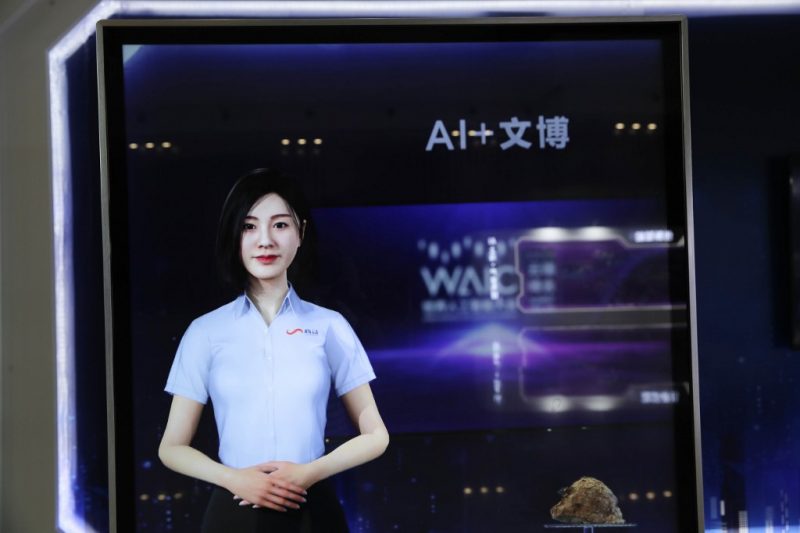China’s cyberspace regulator unveiled sweeping draft measures on Tuesday for managing generative artificial intelligence (AI) services — the tech that powers OpenAI’s chatbot sensation ChatGPT.
The Cyberspace Administration of China (CAC) said it wants firms to submit security assessments to authorities before they launch their offerings to the public.
CAC said Beijing supports AI innovation and popularisation but content generated had to adhere to “core socialist values” as well as to laws on data security and personal information protection.
And those who fall foul of the rules could have their services suspended, face fines or even face a criminal investigation, the agency warned.
Also on AF: Baidu Sues Apple Over Ernie Bot Imposters
The rules followed Chinese tech giant Alibaba unveiling its generative AI model on Tuesday. The company, which until recently was subject to intense scrutiny by Chinese regulators, said it would integrate the model into all of its apps in the near future.
Alibaba’s announcement and CAC’s proposed rules came after a slew of Chinese tech giants, including Baidu and SenseTime showed off their new artificial intelligence models in recent weeks.
The companies have claimed their technology can power applications ranging from chatbots to image generators.
‘Safe, reliable software’
The CAC said China encourages use of safe and reliable AI software, tools and data resources.
Service providers will be responsible for the legitimacy of data used to train generative AI products, it said. They will need to take measures to prevent discrimination when designing algorithms and training data, it added.
The regulator also said service providers must require users to submit their real identities and related information.
The companies will also need to update the technology within three months if inappropriate content is generated by their platforms, to prevent similar content from being generated again, the CAC said.
The proposed rules are open for public comment until May 10. The measures are expected to come into effect sometime this year, according to the draft rules.
Tightening grip on AI
Charlie Chai, an analyst from 86Research, said Beijing’s new rules would potentially slow down progress “in exchange for a more orderly and socially responsible deployment of the technology.”
They would also set up obstacles for foreign companies looking to provide AI services in the country, benefitting domestic companies, he added.
China has for years tightly censored its internet and its tech giants are careful to toe the line, especially on topics considered sensitive such as Chinese President Xi Jinping and the 1989 crackdown on pro-democracy demonstrations in Tiananmen Square.
Search engine Baidu’s chatbot Ernie, released last month, declined to answer questions on such topics or asked to change the subject. The bot remains open only to trial users at the moment.
Also on AF: China’s Tencent Assembles Team To Create ChatGPT Rival
Worldwide crackdown
The Chinese cyberspace regulator’s draft rules come as several governments consider how best to regulate generative AI technology.
While the emerging technology has seen a boom in investment and consumer popularity, it has also sparked much concern about its ethical implications as well as its impact on national security, jobs and education.
Just last month, Italy temporarily banned ChatGPT over its suspected breach of privacy rules.
Meanwhile, Elon Musk and a group of artificial intelligence experts and industry executives have also called for a six-month pause in developing systems more powerful than OpenAI’s newly launched GPT-4, in an open letter citing potential risks to society.
Alibaba’s Tongyi Qianwen
Hours before the CAC published its draft rules, Alibaba unveiled its AI large language model, named Tongyi Qianwen — meaning “truth from a thousand questions”.
In a filmed demonstration Alibaba’s model was seen drafting invitation letters, planning trip itineraries and advising shoppers on types of makeup to purchase.
Tongyi Qianwen will initially be integrated into DingTalk, Alibaba’s workplace messaging app. It can be used to summarise meeting notes, write emails and draft business proposals, the company said.
It will also be added to Tmall Genie, Alibaba’s voice assistant.
The technology “will bring about big changes to the way we produce, the way we work and the way we live our lives,” Alibaba CEO Daniel Zhang told the live-streamed event.
AI models like Tongyi Qianwen are “the big picture for making AI more popular in the future,” he added.
The Chinese internet giant’s cloud unit plans to open up Tongyi Qianwen to clients so they can build their own customized large language models and began registrations on Friday.
Shares in Alibaba rose 1% in Hong Kong trade. Shares in SenseTime, whose new products include an AI chatbot called SenseChat, initially surged but were later flat.
- Reuters, with additional editing by Vishakha Saxena
Also read:
China Wants To ‘Integrate’ ChatGPT-Like Tech in its Economy
Baidu Scraps Public Launch of ChatGPT-Rival Ernie Bot
Foreign Money Flowing Back Into China on Alibaba, Ma Boosts
Why Nvidia Preferred ChatGPT to ‘Useless’ Crypto – Guardian
China Tech Fighting Over AI Talent in ChatGPT Chase – SCMP
























